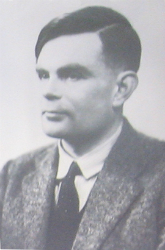 The British government rejected a request today to pardon renowned English mathematician, codebreaker, and computing innovator Alan Turing, who was convicted of gross indecency in 1952. The request for a pardon was initiated by scientists and mathematicians around the world as well as a publicly circulated petition to the government in London.
The British government rejected a request today to pardon renowned English mathematician, codebreaker, and computing innovator Alan Turing, who was convicted of gross indecency in 1952. The request for a pardon was initiated by scientists and mathematicians around the world as well as a publicly circulated petition to the government in London.
The online government petition, which was started last year, asked for a pardon that “may act as an apology to many of the other gay men, not as well known as Alan Turing, who were subjected to these laws.” It currently has close to 24,000 signatures. An earlier petition calling for a formal apology prompted then Prime Minister Gordon Brown to write such an apology on behalf of the British government in 2009.
Justice Minister Lord McNally, who tabled the motion in the House of Lords today, said of the denial:
A posthumous pardon was not considered appropriate as Alan Turing was properly convicted of what at the time was a criminal offence. He would have known that his offence was against the law and that he would be prosecuted.
It is tragic that Alan Turing was convicted of an offence which now seems both cruel and absurd-particularly poignant given his outstanding contribution to the war effort. However, the law at the time required a prosecution and, as such, long-standing policy has been to accept that such convictions took place and, rather than trying to alter the historical context and to put right what cannot be put right, ensure instead that we never again return to those times.
Turing, well known for his work decoding German Enigma codes during World War II and work in the area of artificial intelligence, was arrested and tried for the crime following a police investigation in which Turing acknowledged a sexual relationship with another man. Because homosexuality was at that time illegal in the UK, Turing was convicted and sentenced to chemical castration in lieu of jail time. Two years later he was found dead in his home from cyanide poisoning; his death was ruled a suicide. Turing was 41. 2012 marks the 100th anniversary of his birth, and is being celebrated as “The Alan Turing Year” by a wide variety of organizations and companies.
Image via Wikimedia Commons